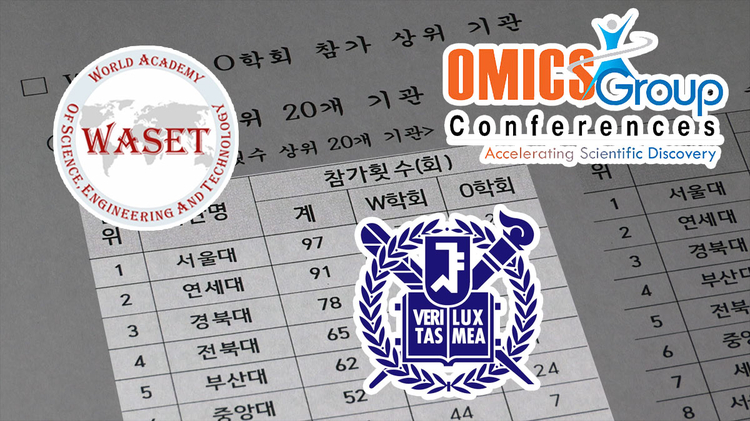
Korean gov't inspection found over 1300 professors and researchers attended 'fake conferences'
2018년 09월 29일 00시 07분
Predatory journals and fake conferences have been considered as a serious problem in global academia for rippling a vast range of damages from wasting public R&D funds to incapacitating the research evaluation system.
In the recent few years, the number of Korean scholars, who use these fake academic services both on purpose and unknowingly.
The so-called ‘predatory journals’ and ‘fake conferences’ are run by pseudo-academic societies, often fake open access publishers operated by business people with no standing in academia. Simply with publication fees worth few hundred dollars, they publish research articles or offer an opportunity to present at a conference without proper review process carried out by reliable editors.
The problem is not new to scholars across the globe, as scholars worldwide have already started discussing about the suspicious groups on the Internet since few years ago. Jeffrey Beall, a U.S.-based librarian, was one of the earliest scholar in the global academia who coined the term ‘predatory journal’ and initiated studies about predatory publishers and pseudo-academic societies.
Korea Center for Investigative Journalism(KCIJ)-Newstapa carried out cross-border investigation with 23 news organizations from 18 countries, led by German public broadcaster NDR, on a pseudo-academic society called World Academy of Science, Engineering and Technology (WASET). The Turkey-based organization is one of the most representative example of the kind.
Newstapa held sting operations at one of the international conferences hosted by WASET, aiming to explore how the fake society runs fake journals and conferences. We first generated a fake research paper using a program called ‘SCIgen,’ an automatic thesis generator built by MIT students, and submitted it to one of WASET’s conference. The program is designed to make papers with random texts available online in a format that looks like a normal research article. The fake paper was selected for presentation at the conference held in Venice, Italy in June, where we successfully completed presentation.
After returning from Venice, Newstapa data journalists analyzed all data uploaded to the WASET website via data scraping.
By country, Korea was ranked at the 5th in the worldwide data in number of full papers and abstracts submitted to WASET journals and conferences. By individual author, Korean scholars were ranked at the 2nd, 3rd, 4th and 6th in the global data.
By institution, the nation’s No. 1 Seoul National University (SNU) topped the local rank with 100 full papers and abstracts published to WASET journals and conferences. Other top-notch colleges including Yonsei and Korea University as well as state-run universities were listed in the top 10.
Number of Korean scholars who used WASET journals and conferences showed rapid increase since 2014. Over the past few years, at least 1,000 scholars used WASET services every year. A total of 4,227 professors, researchers and students from 272 Korean institutions were found to have published papers and abstracts to WASET since 2007.
A total of 1,812 scholars from 177 Korean institutions were found to have published research results to OMICS International, another fake publisher similar to WASET, since 2009.
The cross-border investigation between Newstapa, NDR and 22 other partners across the globe, unveiled the damages of the pseudo-academic societies and fake science they generate.
They lead the academia waste public R&D investment, which is created with taxpayers money and is the largest source of R&D funding in many countries.
Veteran scientists, including Nobel prize laureates, also warned that the fake publishers incapacitate the research ethics and research evaluation system in the academic ecosystem.
KCIJ-Newstapa will continue exposing the problems of pseudo-academic societies in Korean academia and beyond.
뉴스타파는 권력과 자본의 간섭을 받지 않고 진실만을 보도하기 위해, 광고나 협찬 없이 오직 후원회원들의 회비로만 제작됩니다. 월 1만원 후원으로 더 나은 세상을 만들어주세요.